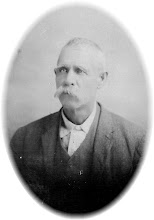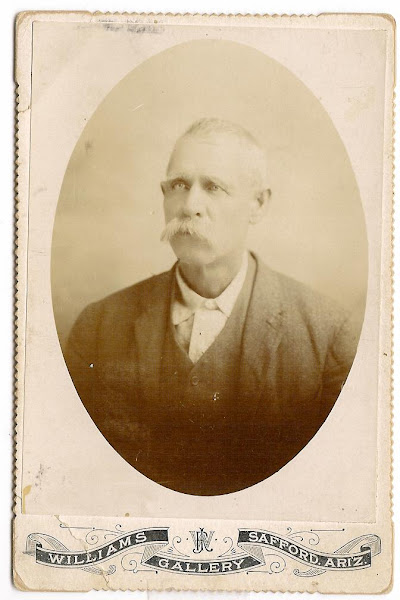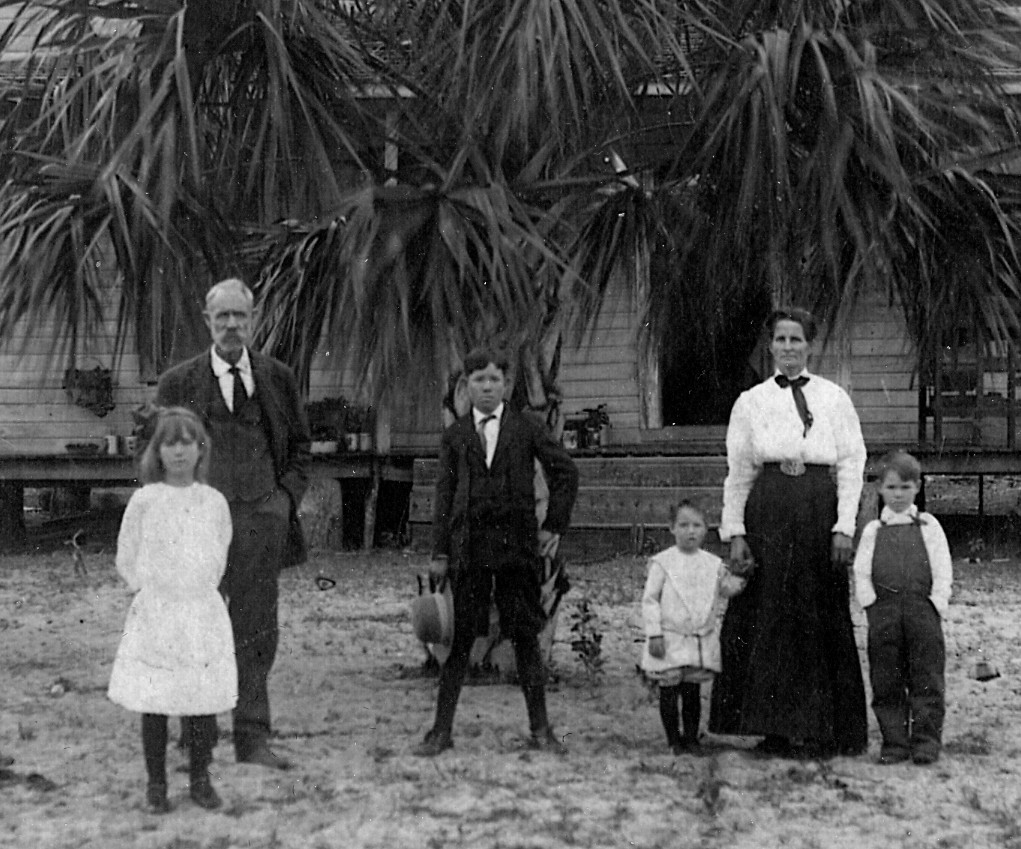[I have copied this just as it was written. There are a couple mistakes but we can address them in separate postings.]
Son of Allen "J" McGrath and Martha A. Oliver. He lost his father when he was about four years old. When he was six years old the civil war began. His mother found it necessary to move to Atlanta, Georgia. She sent Alonzo to live with his sister, Henrietta Bell, and brother-in-law, Jesse J. Brady who lived in the country in Carroll County, Georgia. They had no children of their own. Father has always regretted that he grew up in a home where there were no children. He was raised under very strict rules, as Uncle Jesse Brady was a devout Methodist. Father, however, was very grateful for the care and treatment he received in the home of his Aunt and Uncle. As a result he developed a very high standard of values, with his dealings and obligations to other people. His word was as good as his bond. He lived with Uncle Jesse Brady till 18 years of age when he went to Atlanta to live with his mother and worked as a book agent out of an office, on Peach Tree Street. He lived there till he married at about 20 years of age, M. Nancy Warnick, of Carroll County, Georgia. She was born March 9, 1856. She died 6 January 1878, at Gallup, New Mexico. Alonzo moved to Heflin, Cleberne, Alabama in 1875 when he met the Mormon Missionaries and accepted the gospel. Alexander Stewart baptized him and his family 27 May 1876, in Alabama, who later became his father-in-law. As is usual when people join the Church, persecutions began and word came to them, by traveling Missionaries, that a company of Saints was being organized in Arkansas to go to Arizona the following spring. Three of the families of Saints who lived there, (Jesse Brady, Alexander Stewart, and James A. McGrath) decided to sell what they had and equip themselves with teams and wagons and join the company in Arkansas, for the trip to Arizona, the following spring. They moved immediately to Ozark Mountains, Clag Co., Arkansas and spent the winter. They left for Arizona about April 1877.
The trip west carried with it the hardships of traveling with wagons and teams, but was made without loss of life and brought them to Gallup, New Mexico, in November 1877. There were about 300 people in the caravan. In Gallup, they were caught in a snowstorm and were obliged, to camp for the winter. Here tragedy overtook them. One family dropped out and later caught up with the main camp. In their absence they came in contact with small pox, which included Alonzo’s wife, Nancy, and infant daughter that was born on December 31, 1877, and died on January 11, 1878. Nancy died on January 6, 1878, leaving him with their older child, William Lindzy, and his widowed mother to care for.
As soon as spring arrived, the company moved down on the Little Colorado River in Arizona, where Joseph City is now. Alonzo stayed in Joseph City. Jesse Brady and Alexander Stewart went to Sunset. At this time they had the experience of trying to live the United Order. In July of 1878, a company of Saints from Utah that had been sent by the Church to settle Northern Arizona came through on their way to Silver Creek or Snowflake. The Stewart’s, McGrath's, and Brady’s, moved on a few miles further south and were among the first settlers in what is now known as Taylor, Arizona. While here on December 13, 1878, Alonzo McGrath lost his only child, William. This child was buried in Snowflake. On February 9, 1879, he married Delilah Sophronia Stewart in Taylor, Arizona.
To this union was born 11 children. The first was born 4 February 1880, and died the same day and was. Buried in Taylor, Arizona. During the summer of 1879, he went to Fort Apache to work for the government putting up prairie hay till after the frost came. He brought home with him provisions that would last for a year. The summer of 1879 was a dry summer, all the water holes between Snowflake and Albuquerque, New Mexico, had dried up till they couldn't bring in merchandise. The result was that all the flour in the settlement was used up and they had to use flour made of barley. An experience many people referred to as the hardships of pioneering. Father next moved to Shumway, where he helped Charles Shumway build the first flourmill in that part of the country. In February 1881, father moved to Concho, and attempted to make a living at farming. Since there wasn't any water, each family could not operate enough land to support a family. In 1887 he moved 18 miles south of Concho on what is known as Mineral Creek. (See Frank's history for details of life here.)
In 1892 we moved to Show low. We left Show low in 1894, camping the first night on the White River below the forks of the road. The next day we went to Turkey Flats. While we stopped for noon, a group of Indians came along. The leader of the bunch saw Nancy, (she was 11 years old with long pretty hair) and wanted to buy her. Of course, father said she wasn't for sale. The Indian offered 20 ponies for her. When he was refused, the Indian said, "Me catchum papoose, me catchum papoose." So we were on the watch for them for quite some time. We went to Fort Apache, then on to Graham. We had to borrow some drinking water and it was so hot and nasty, all the children wanted to go home. (Near Bylas.)
We had two cows and calves and two wagons when we crossed the Gila River. The cattle all went into the water and down to a whirlpool. Joe was on Fly and she wanted to lie down, and wouldn't cooperate. Father tore the harness off one of the horses and went to Joe's rescue. We went on to Graham to Grandfather Stewart's. Father rented 20 acres of land from Sherman Stewart and sowed wheat (Father had $9.00 when he left Show1ow). He had to do anything he could to make a means of living. Being very resourceful, he was able to do most anything, so he didn't have much trouble getting work. The wages were so small it was hard to support a family. I remember very vividly one job he took of cleaning out stumps from the farmland of a Mr. Peterson for 25 cents a stump. While it appeared the stumps were not very large, when he got to take them out we found the tops had been cut many times without affecting the growth of the roots. The result was that one stump of an ash tree took two days for two of us to dig it out. It took 3 or 4 weeks to finish the job. Sometimes we made $ 1.00. Following spring, March of 1895, father heard of a new canal being made in the Duncan area where there was some land that could be homesteaded, so he moved the family to Duncan Valley and rented a farm from William Couthern. He planted a crop, and then turned it over to Joe and I to care for while he went to find work to support the family. Making inquiry from a blacksmith in Duncan for work, the blacksmith asked him if he could fill a wagon wheel. He said, "of all the things I can do, I can do that best." The blacksmith asked father if he was lying, and father said, "no!" (Father was a wheelwright in his younger years.) He got all the wheelwork and horse shoeing that came into this shop.
Father could play most instruments in a few minutes. He could sing a song he had heard a few times. He could do just most anything. Father was trying to learn "Over the Waves", and part of it he would be way off. Bertha told him it was wrong, and would sing it for him like it should be sung. He told her to go on and mind her business. Father sang a lot, with children, and sang old hymns. Father took us to Thatcher and left us at Cheney’s while Pa went-a-courting. When we went home we knew he was happy because he sang extra well.
The first summer in Duncan, he went back to Safford to gather the grain he had planted there. While he was gone, Belle got very sick. Of course, Mother wanted Father, but there was no way to let Father know quickly, so mother sent me, Frank, to Safford to get Father. When I got there. Father took the harness off the workhorse, told me to rest, and left for home. The following fall he was away again. When Bertha was born he had arranged with Mr. Couthern to go to Duncan to get Mrs. Madison in case the baby came before he returned. When mother decided it was time, I went to get the team and found the team of mules had left by the open gate. We, Mr. Couthern and I got on horses and went for Grandma. She prepared to go, but she said she had never ridden a horse. She got on behind Mr. Couthern however. They went, and in due time the baby arrived. Grandma said she had a baby for the children. Of course, they wanted it, and would trade their yellow cat for it. Everything was going quite nicely till the whole family had the measles. I had them first and 10 days later the rest took them. This was the cause of mother's death, since she took them, too.
Father sent me to town to get Grandma Madison, and to stop on the way and send someone to administer to mother, and not to spare the horseflesh. From him, that meant to hurry, hurry! Mrs. Madison got back before mother died. She died 14 February 1898. He was left with 9 children, the youngest 11 months. (Check Frank's history for details here.) Pa married a couple, one time, and they wanted to stay on their horse to be married but they finally came in and he married them.
Frank, Joe, and Father went to town. It was cold weather. By the house was a pile of lumber. We emptied the ashes from the fireplace and they caught the lumber on fire. Father, Frank, and Joe saw the fire and didn't spare the horses getting home to put the fire out. Of course, Joe woke Mary up and said, "You little fool, why did you set the house afire for?”
Grandmother Jackson was still with us. She could sew beautifully. A Negro boy came by one day and Father invited him to eat with us. Grandma Jackson would not eat at the same table as a colored man.
Father courted and married Alice Arminda Hendricks in the summer of 1901. Four children were born to this union. They lived on the farm and things went along about the same for a while. In October of 1900, he took four children and went to Salt Lake City and had his temple work done. He had his wife and those four children sealed to him. Also, his wife, Nancy Warnick and her children were sealed to him. Following summer he married Alice. In 1912, Father and Alice and their children left and moved to Florida to make their home, where lie died in 1925. Throughout his life he was a very faithful father and friend, and a staunch member of the Church. He always fed the strangers who came by his door.
Mary Packer's Contribution
One Christmas we thought that we wouldn't have Christmas because Dad couldn't get back from Concho on account of snow. We got two sticks of candy, an apple and a handful of prunes. Walnuts were gathered from trees. We did have faith enough to hang our stockings on the town tree. Someone for a gag gave a young man a doll, and somehow the doll finally came to us. Grandma Cheney came in November to help deliver a baby for mother. She stayed until she had to go home and then she came back. She had to go home for Christmas. Then she came back again and stayed till late in January. She had to home again before the baby arrived. Mother would make butter and sell in town.
We had a corral by the house. Mary had hair that curled. Joe wanted me to be a sheep so he cut all my curl off. They had just been shearing sheep. We got it, I'll tell you.
Henrietta Bell should be Mahetabel.







